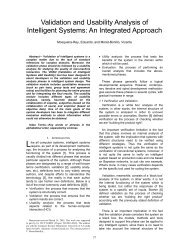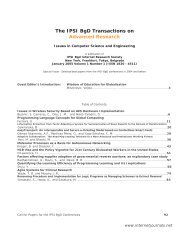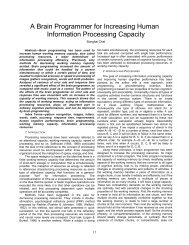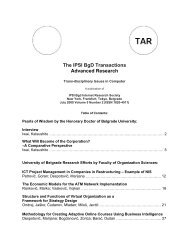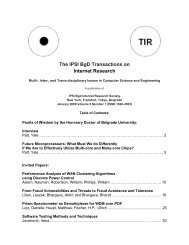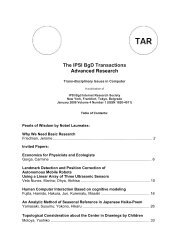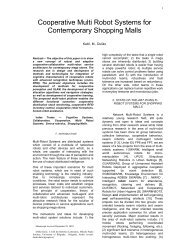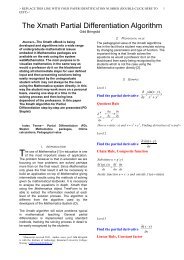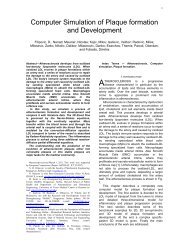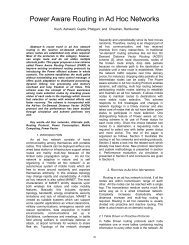The IPSI BgD Transactions on Internet Research - Welcome
The IPSI BgD Transactions on Internet Research - Welcome
The IPSI BgD Transactions on Internet Research - Welcome
You also want an ePaper? Increase the reach of your titles
YUMPU automatically turns print PDFs into web optimized ePapers that Google loves.
educati<strong>on</strong> in mathematics.<br />
Figure 4 Using the Archive<br />
<str<strong>on</strong>g>The</str<strong>on</strong>g> Xmath calculator is further developed. A<br />
sophisticated <strong>on</strong>line calculator has been missing<br />
in c<strong>on</strong>necti<strong>on</strong> with mathematical and scientific e-<br />
learning and will increase the performance/price<br />
rate of the system.<br />
3. MODULES AND OBJECTS<br />
A module is a collecti<strong>on</strong> of objects- a menu<br />
card of objects- which are grouped under a<br />
mathematical topic. Metadata assigned to the<br />
object may suggest to the publisher the order in<br />
which these objects can be organized. As an<br />
example the main topic level could be Calculus,<br />
next level Functi<strong>on</strong>s and then the module<br />
C<strong>on</strong>tinuity divided into different objects for<br />
download.<br />
A module may c<strong>on</strong>tain an introducti<strong>on</strong> object,<br />
theory objects, examples objects, exercises<br />
objects, assessments objects, applicati<strong>on</strong>s<br />
objects, graphics objects, animati<strong>on</strong>s objects and<br />
student projects objects. Not all modules will<br />
necessary include all the different kinds of<br />
objects. <str<strong>on</strong>g>The</str<strong>on</strong>g> objects in a module may be<br />
downloaded independently of each other but the<br />
publisher will have access to informati<strong>on</strong> about<br />
the c<strong>on</strong>necti<strong>on</strong> between the objects and how to<br />
organize them. However if a publisher <strong>on</strong>ly needs<br />
the animati<strong>on</strong> object, say, he will then download<br />
<strong>on</strong>ly this object.<br />
(similarly as for cybernetics). Our modules called<br />
“Discovering Mathematics” do not bel<strong>on</strong>g to any<br />
specific field of mathematics; they are built<br />
primarily from the “Problems point View”.<br />
Mathematical problems, mostly drawn from<br />
calculus, are presented in a form which enables<br />
to create, in the process of their soluti<strong>on</strong>, an<br />
interc<strong>on</strong>nected network of new problems.<br />
To help the user to develop ability in solving<br />
problems the network then helps to find easier<br />
problems which she can solve if she is not able<br />
find a soluti<strong>on</strong> of the first problem or more<br />
complicated <strong>on</strong>es of the same character.<br />
5. MATHEMATICAL DICTIONARY<br />
<str<strong>on</strong>g>The</str<strong>on</strong>g> interface to the repository of modules<br />
(dMathArchive) is intended to be easy to use and<br />
a selected mathematical item may be search for<br />
to find the definiti<strong>on</strong> and an introducti<strong>on</strong> to the<br />
item. This will work like a mathematical dicti<strong>on</strong>ary<br />
with a wide range of items being present.<br />
Searching for “Eigenvalue” the definiti<strong>on</strong> and an<br />
introducti<strong>on</strong> to the topic “Eigenvalue” will show<br />
up.<br />
6. EVOLUTIONARY SYSTEM<br />
In the design of the dMathArchive the c<strong>on</strong>cept<br />
of “Evoluti<strong>on</strong>ary user c<strong>on</strong>trolled development”<br />
(EUCD) will be important. <str<strong>on</strong>g>The</str<strong>on</strong>g> dMath project will<br />
implement this c<strong>on</strong>cept by letting<br />
users/publishers develop their own objects for<br />
upload to the database repository or modify<br />
existing modules/objects. This will do the archive<br />
“c<strong>on</strong>tinuously growing” and give it an “agile<br />
development ” with focus <strong>on</strong> changes. Of course<br />
the modules and objects have to be reviewed by<br />
the editorial board of the archive.<br />
<str<strong>on</strong>g>The</str<strong>on</strong>g> same philosophy may be used for<br />
developing software packages for the Xmath<br />
Calculator.<br />
In the project modules in Number <str<strong>on</strong>g>The</str<strong>on</strong>g>ory,<br />
Calculus, Geometry, Differential Equati<strong>on</strong>s,<br />
Linear Algebra, Statistics and Probability,<br />
Numerical Methods, Interdisciplinary<br />
Mathematics and Fourier Series will be<br />
developed.<br />
4. INTERDISCIPLINARY MATHEMATICS<br />
Some of the modules require a special<br />
attenti<strong>on</strong>. <str<strong>on</strong>g>The</str<strong>on</strong>g> project is highly Multidisciplinary<br />
and Interdisciplinary and will develop modules in<br />
interdisciplinary mathematics [24]. Our aim is not<br />
to define what interdisciplinary mathematics is<br />
Figure 5 Evoluti<strong>on</strong>ary User C<strong>on</strong>trolled<br />
Development<br />
24



